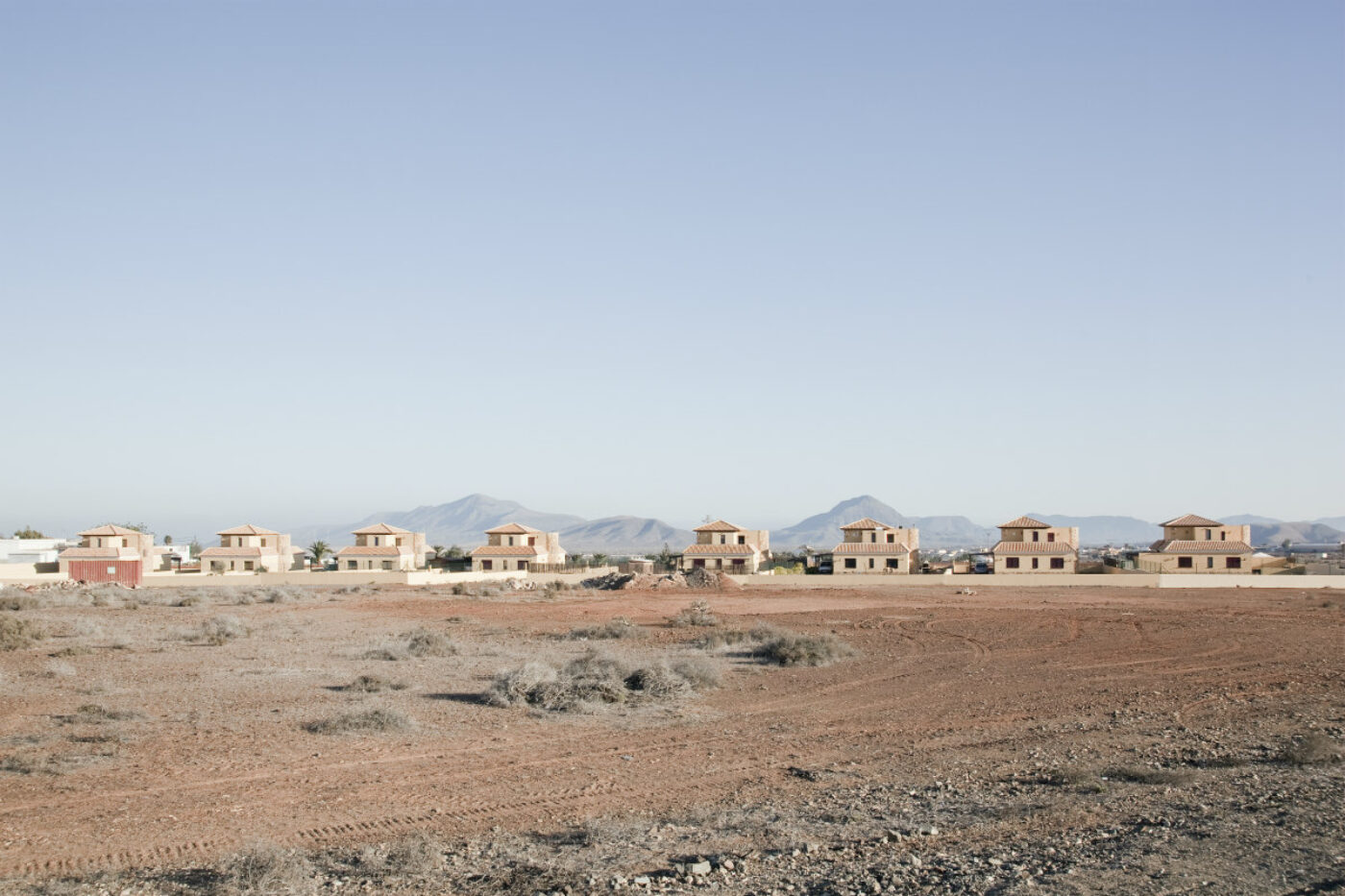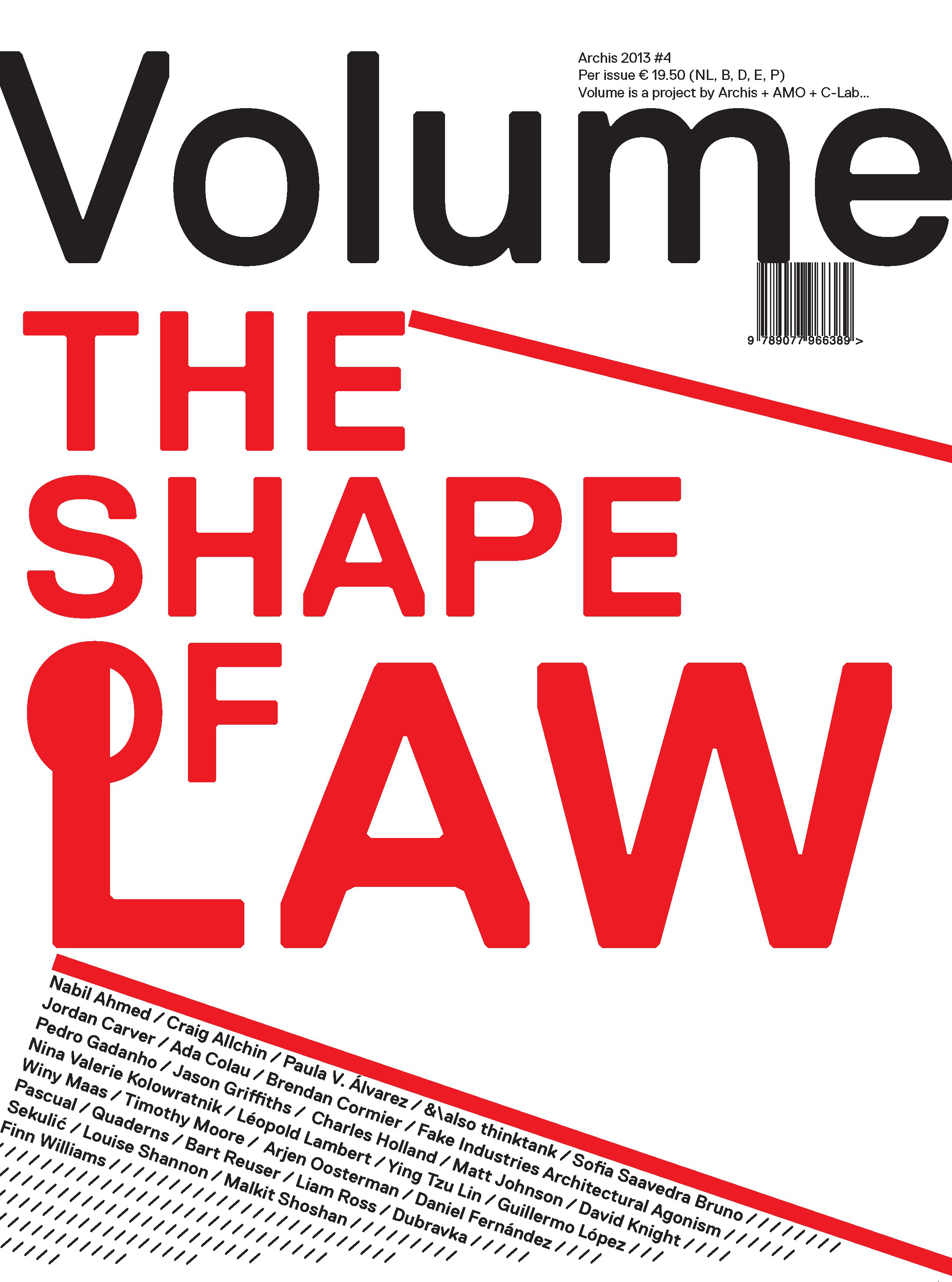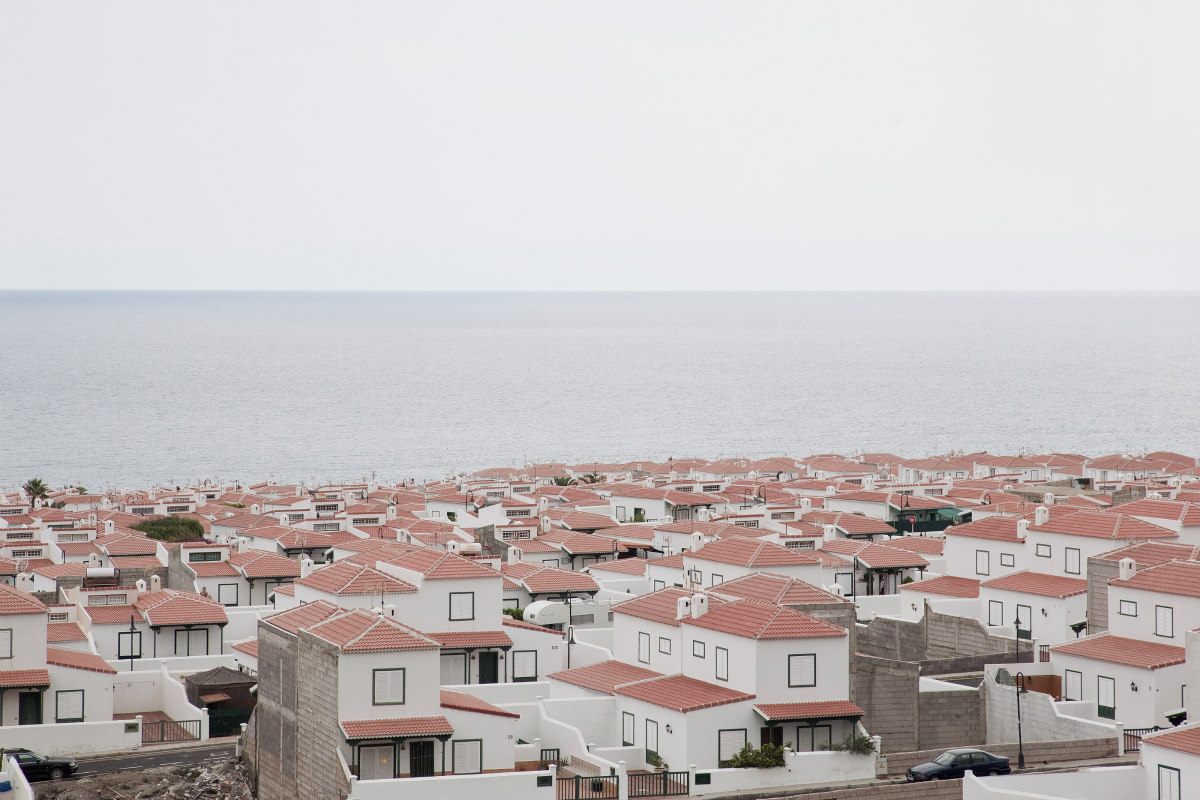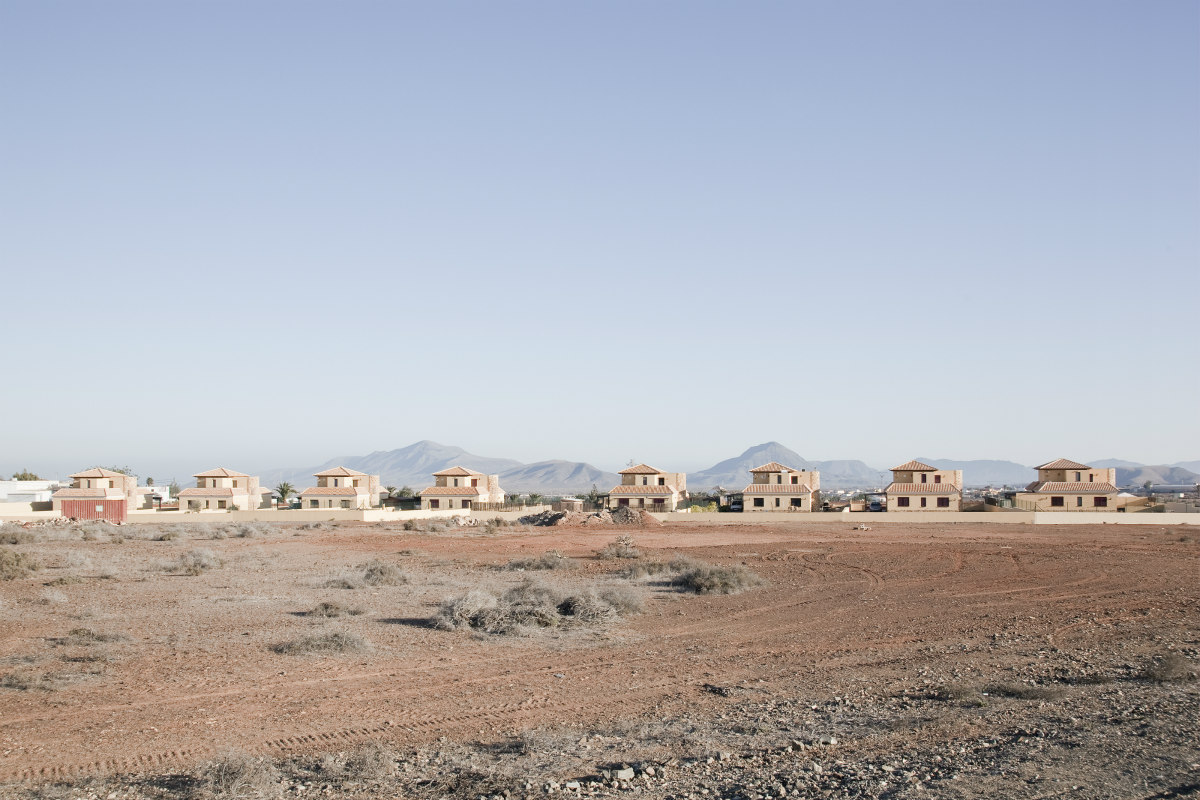
2015 marks Volume’s 10th birthday. The coming weeks we’ll republish our readers’ favorite articles. If you feel tempted to highlight yours with a brief motivation, please send an email to 10years@archis.org.
My pick for 10 years of Volume is the Quaderns interview with the now-Mayor of Barcelona Ada Colau titled Re-righting Ownership, published in Volume #38: The Shape of Law. Back in 2013, PAH (Plataforma de Afectados por la Hipoteca, Platform for People Affected by Mortgages), which Colau founded, was awarded with the European Citizens’ Prize for processing a citizen initiative to propose that government develop a new mortgage legislation.
The interview explains that the housing question is global, and that it is both the cause and symptom. The housing question is about the system, the (no) rule, and the law. Aspects of it, such as displacement, privatization, (in)equality, crisis are relevant to all of us. In response to how to deal with the question, Ada Colau mentions that we need to look at it across disciplines, nations, relations. She also gives good clues for architects, as well as for architectural education (though the latter leaves me wanting more!)
Merve Bedir graduated from the Department of Architecture, METU, in 2003. She was involved in a variety of projects in Turkey, Egypt, Georgia until 2008. Since then, she has been conducting her PhD on behavior and consumption, in the Faculty of Architecture, TU Delft, where she was involved in projects about urban regeneration and reuse in Salzburg and Copenhagen. She has several publications about urban transformation, sustainable development, and user behavior and energy consumption. She was a freelance curator for the Netherlands Architecture Institute in 2012, where she made two main projects on reuse of buildings and urban transformation in Turkey. This year, she curated ‘Vocabulary of Hospitality’ in Studio X Istanbul in conjunction with the Archis exhibition ‘Architecture of Peace’ and also ‘One Architecture Week’ 2015 in Plovdiv.

Ada Colau is not an architect, sheʼs an activist trained in philosophy at the Barcelona University, but she has done for architecture more than what is thinkable for some practitioners in our field. Founder of Plataforma de Afectados por la Hipoteca [PAH], a Spanish grassroots organization that campaigns for the right to a home, they have succeeded to process what we know as an ILP (a citizen initiative) to propose that government develop a new mortgage legislation. This ILP, backed with 1,402,845 signatures from citizens, proposes the regulation of three key aspects to guarantee housing rights. Due to all this work, in January 2013, the PAH was awarded the European Citizens’ Prize. In this interview, we talk with Ada Colau about how to confront the law in order to find feasible solutions and legal ways to improve our current housing situation.
Quaderns: Before discussing the future of housing, we would like to hear your thoughts about the current situation in Spain. How do you interpret its recent history? Can we come up with some useful conclusions?
Ada Colau: If we want to focus on where to go, first we need to make it clear what the mistakes until now have been. In 2006, at the peak of the real estate bubble, there was no discussion at all about housing, it was not a main topic in politics nor in the mass media. Apparently, the Spanish housing model was supposed to be exemplary and it was even intended to be exported abroad as a model of growth. It was the so-called ‘Spanish miracle’ regarding the building industry and access to housing. It was basically focused on private property, a situation that seemingly favored not only high-income families but as well low-income citizens, who could easily get mortgages in order to own their properties and in the future leave them in bequest to their families.
But there was a contradiction that remained unexplained, since, due to the rise of housing prices, it was becoming increasingly difficult to gain access to housing, specifically for young people. And all of that was happening in the European country with the most new housing built in the past decade.
Q: It is evident that there is no coherence between the overproduction of housing and the access to housing. Can you tell us why?
AC: We knew there was a housing bubble and that virtually the only way to have access to housing was through private property and therefore by becoming indebted. Despite this, the government still denied the bubble, and entrepreneurs and pundits continued to be invited by different media in order to defend their own position.
With this capitalist approach inherited from the Reagan-Thatcher era, everyone was intended to win. Everyone was able, by means of credit and mortgages, to have as much private property as they wished. But nobody established the difference between those who bought their house to live there and those who bought properties in order to speculate with them. This is what happened and it affected the working class people most.
Q: To what extent can legislation influence all this process?
AC: The government of Spain has ratified all international treaties that guarantee the right to housing and the obligation to build public housing. This is perfectly reflected in the International Covenant on Economic, Social and Cultural Rights as well as in the remarks made by the Committee of the United Nations. In the Spanish Constitution, the famous Article 47 states that the State and public authorities are not only obliged to ensure access to a home, but should also prevent speculation. Whereas, in reality they have allowed speculation and encouraged it more than anyone else; in the same vein the capital gains obtained through urban planning should have been reinvested in society, which has systematically not happened.
However, it is important to know that a regulatory framework exists. Article 33 of the Spanish Constitution, for instance, deals with the right to private property, establishing limits in order to assure the public interest. In the same way that you can not have a forest and burn it or you can not contaminate a river crossing your land, because it undermines everyone’s rights and goes against the public interest, we understand that building thousands of apartments and leaving them empty is also damaging the societal role of private property.
Q: In this regard, since we were talking about legislation and its application, how could we rethink policies regarding the right to housing?
AC: Just a few decades ago, the majority of the population rented their homes. Then came a radical change with public policies that offered incentives to promote an ownership model that was new. In this sense, the public administration turned a blind eye and allowed financial institutions, major real estate agents, and builders to make their pile with this construction-based economy. In fact, the public administration participated directly in this model, and benefited from it by funding itself on the basis of property speculation, land-use reclassification, and taxes on transactions linked to the ownership model, while aware that it was a shortsighted model that sooner or later would explode. It did all that by incentivizing and de-regulating the credit market, in other words, creating a situation where rental was not a real alternative.
Renting in this country is expensive and unstable while quality standards are poor. And on the other hand it is completely legitimate that people can think of planning their lives in the long term. As we grow old we don’t want to move from a home to another too often, nevertheless, the only guarantee that we can count on in Spain is that you can stay at a rented home only for five years without any guarantee that the validity of the contract will be extended, and even the Partido Popular tried to reduce this period to three years.

Q: What do you believe are the differentiating factors between the Spanish case and that of Europe?
AC: After the Second World War, a social pact was proposed and certain minimum rights were guaranteed, such as housing, education, healthcare, etc. Housing forms part of this pact in a large part of Europe, but in Spain, despite healthcare and education forming part of it, housing was left out. In fact, together with Greece, we are by a long stretch the country in Europe that has created the least subsidized housing: less than one percent at the height of the property boom, and of this one percent there was practically nothing in terms of rental. In other words, we are basically talking about officially subsidized private home ownership, which means over-indebtedness. We know this now because we are finding cases of mortgage executions affecting subsidized housing.
The administration argued here that rental housing entailed several management problems and even more progressive governments have fostered property-based models that have led to over-indebtedness of a large proportion of the population. Another public policy affecting the housing issue is fiscality. Both under conservative and progressive governments, tax deductions have promoted property-based models, so that this biased and aggressive incentive has worked against rent-based models. In this sense, renting has not been strengthened as a real alternative.
Q: What are the reasons that have led to the promotion a property-based model instead of a rent-based one?
AC: This model based on property does not start under democracy but under dictatorship, when large social rental developments were seen as a danger, since they generated tenant associations that could easily oppose their owner – Franco’s state. In order to dismantle this situation, housing was massively privatized, as it happened in England when Thatcher privatized the social rental fleet. In the case of Spain, José Luis Arrese, the Francoist Minister in charge of this privatization process, said literally: “we’ll turn this proletarian country into an owners country”1, thus framing this process in an operation that is not only economic but also a way to domesticate society.
A country based on property is by definition a conservative country, more individualized, and if there is indebtedness, even more domesticated, as people are more dependant and more docile at work for fear of losing their job, which allows them to pay their mortgage.
Q: What criteria could ensure a subsidized rental policy?
AC: At best, the price of rent should not exceed thirty percent of the income of the family unit. The price of housing should be in relation to income. When by contrast it’s about the landlord’s expectations, obviously there is a gap between the expectations and the real potential of the population. Clearly housing should be accessible to people who need it.
What is unacceptable is rescuing some nationalized banks like Bankia or Catalunya Caixa, when they are privatizing their profits but socializing their losses. In these cases ‘nationalization’ means to clean up their mess and return them to the private market, without imposing any social obligation, which would seem obvious.

Q: So, in what way do we need to reconsider home ownership culture?
AC: Whatever the circumstances, it is not a case of demonizing private ownership. It is legitimate that people desire their own space to develop, both individually and collectively, in a stable, safe and affordable way. And in Spain that has only been permitted through private ownership. There are legitimate aspects of private home ownership that respond to these desires, although, evidently, there may be other forms of occupancy that allow it, such as a better regulated rental sector than we have at the moment, or forms such as transfer of use in cooperative systems.
We have to frame the debate in terms of finding the best way of satisfying the needs of the majority of the population, because if we frame it in solely ideological terms, which is what has happened to date, few people will understand it.
Q: Where should we turn then?
AC: For economic, social and environmental reasons, it makes no sense to propose the construction of new homes. We must start by rehabilitating those that already exist, and give them a social function. Moreover, we ought to consider which models of possession are appropriate for these homes. We can propose a better policy for rental models, and follow some case studies found in Germany. In Germany, more than fifty percent of the population live in rented homes; there are limits for raising rent and, beyond being more stable and secure, there are policies that protect the lessee from being evicted without a cause.
Q: The existence and strengthening of associations and platforms such as PAH clearly show that citizens are conscious about the housing problem and are self-organizing to address that.
AC: It is symptomatic of the poor functioning of our democracy that, for a long time, serious problems like housing are dealt with by civil society, which acts without any resource or formal organization. Large institutions, including the government, political parties or labor unions – not only did they not see problems coming, they were actually a part of them.
Civil society is far ahead of the government, often kidnapped by the economic interests of a privileged minority. An alternative institution is being generated from the bottom-up, where people are self-organized to meet their basic needs. And that refers not only to housing but also to other associated rights, such as the right to the city.
Q: From your point of view, what might the role of architects be in the redefinition of this model? To what extent can we participate in the construction of new models of access to housing?
AC: The most important thing is not to think separately from society. In this sense, universities are making a mistake by individualizing professions following a very aggressive neoliberal model. This ends up converting everything into an individualist professional career, when in fact we are talking about disciplines with an obvious social function. Perhaps the most important thing for architects, as citizens, is to get closer to society, to mingle with people and contribute wherever they can be most useful. They will easily find ways of putting their special knowledge and skills at the service of all that needs to be done.
This interview has been partly published on Quaderns #265 ‘House and Contradiction’ and translated by Debbie Smirthwaite.
Notes
1. The original sentence in Spanish contains a pun “Haremos de este país de proletarios un país de propietarios” since propietarios (owners) and proletarios (proletarian) are almost written in the same way.